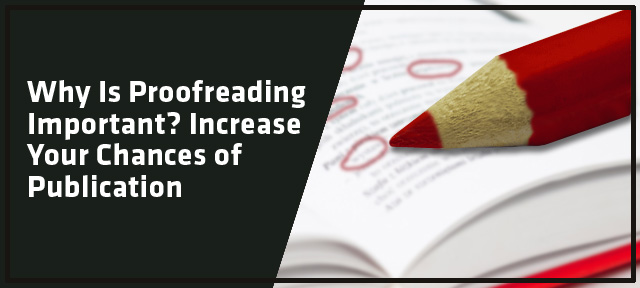In the entire course of an academic publication, the role of editing and proof-reading is often ignored. It is understandable that researchers focus more on the scientific aspects of their publication, but a journal seeking to publish an article also has to take other factors into consideration and this is where proofreading becomes critical.

Why is proofreading important?
The issue may be seen from 2 different perspectives for clarity.
- a) a journal editor is the first point of contact for a manuscript and they look at a submission purely from an editorial point of view. An editor looks to enrich the reputation of the journal and look for academic publications of high quality both in terms of scientific content and writing. An editor has numerous manuscripts before them to choose from and they search for reasons to reject manuscripts as much as reasons to accept them. (Alprazolam online) A manuscript that accurately adheres to a publisher’s guidelines, has an organized structure, and is written in a language that lucidly communicates its message is far more likely to be accepted for publication.
- b) a person doing proofreading is the first prospective reader of a publication. The person is not familiar with the research as the author and has no predetermined idea about what the author seeks this then allows for a unique perspective of how a new reader would react to the publication if they were to read it in the journal. They can catch inconsistencies, ambiguities, and other narrative errors that might escape the author, who invariable is more focused on the scientific aspect of the publication. A trained professional expert with prior experience has the skills to correct and polish the grammar, spelling, and punctuation; identify if the references are accurate, thorough, and consistent; and thereby ensure that the article meets the high standards expected by any reputed journal for publication.
How to increase one’s chances in publication
The first and foremost step is to take professional services for proofreading. This applies especially for new and inexperienced academics making their foray into scientific publication in journals.
A professional helping an author with proofreading is actually an author’s ally who helps elevate the quality of the author’s publication. A qualified proofreader is an academic intermediary between the author and the reader who helps resolve various language-related problems that may prevent successful communication of the scientific message of an author’s research. This helps in ensuring that an article qualifies for publication in a reputed journal which in turn ensures better visibility for the author.
Conclusion
Proofreading is critical for successful academic publications in journals and professional services not only help address this matter but also helps the free author of cumbersome burdens of fin tuning their articles. Little wonder that many experienced authors regularly subscribe to such services and free themselves to focus on their own scientific activities.

